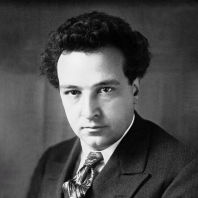Arthur Honegger
composer
Arthur Honegger was one of the most prolific composers of his generation, with around 200 works ranging in style from medieval polyphony to contemporary polyrhythms and tonality, as well as elements of jazz. Even in the years before the Second World War, he caused a sensation with his large-scale choral compositions, ballets and film and radio scores. In 1938, he was elected to the Institut de France, followed ten years later by his appointment as an honorary doctor of the University of Zurich.
Born in 1892, Arthur Honegger was the son of a Swiss coffee importer who had settled with his family in Le Havre on the French Atlantic coast. After early violin lessons with Robert-Charles Martin, he continued his training at the conservatory in Zurich from 1909 to 1911. Honegger then moved to the Conservatoire in Paris, where his teachers included Charles-Marie Widor and Vincent d’Indy. While in Paris, whose innovative music scene was dominated by the ballets of Serge Diaghilev and Igor Stravinsky, among others, the young composer soon became a member of the Groupe des Six together with Darius Milhaud and Francis Poulenc. Honegger remained associated with the group and its ideas for a time, but soon went his own way. He had his first major success in 1921 with his oratorio Le roi David, and almost simultaneously achieved a similar triumph with the orchestral piece Pacific 2.3.1, in which the rapid journey of an express locomotive is recreated musically. In addition to the ballets for Ida Rubinstein (who also commissioned the dramatic oratorio Jeanne d’Arc au bûcher), his operetta Les Aventures du Roi Pausole from 1929/30 was also hugely popular, selling out more than 500 performances in a row. After spending the period of German occupation in France, Honegger undertook a concert tour to North and South America in 1947, from which he never recovered: the composer, who was suffering from angina pectoris, died of a heart attack in Paris in November 1955.